WittKieffer Impactful Leaders Podcast
As the premier executive search and leadership advisory firm, developing impactful leadership teams for organizations that improve quality of life, WittKieffer has a front row seat to the top leaders in the healthcare, education, and life science markets. Every day, we’re working with leaders who want to create a better tomorrow—to make an impact for their organizations, communities, and the wider world. This is WittKieffer’s Impactful Leaders Podcast – this is not your typical leadership podcast. It’s a personal and introspective chat with today’s most impactful healthcare industry leaders. We’ll cover personal topics from health and wellness to work world matters, delivering actionable advice and insightful takeaways. And we’re sure you’ll be inspired to find—or strengthen—your purpose.
Episodes
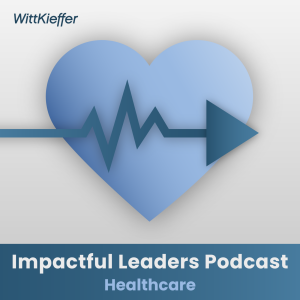
5 days ago
5 days ago
Early in both their leadership careers, Cory Shaw and Greg Postel, MD, came to the realization that their decisions and actions had impacts far beyond their immediate intention. As Shaw puts it, "How I say something, where I say something, when I say it, are going to have unintended consequences." Both understood that this came with great risk but also great opportunity, that small, intentional decisions can have far-reaching positive outcomes – a butterfly effect. They now apply this thinking to UC Health to imagine the impact they can have on the more than 13,000 faculty and staff, and the influence the organization can have on the greater Cincinnati community and beyond.
Shaw, President and CEO of UC Health, and Dr. Postel, EVP for Health Affairs and Dean of the UC College of Medicine, are helping to create an ambitious vision for the system that includes making the metro area one of the healthiest in the U.S. They aim to achieve this through growth as well as partnerships with other local health systems and providers.
In Part I of their conversation with WittKieffer Senior Consultant Christy Pearson, the two executives reflect upon their respective leadership journeys and the opportunities ahead – in a competitive market and intensely challenging environment. Dr. Postel explores the difficulty of incorporating artificial intelligence into the medical school curriculum in an era when students are more technologically savvy than their instructors. "The pace of change of technology in medicine has never been more brisk," he says, meaning the way medicine is practiced will be dramatically different in just a few short years. The current financial and regulatory climate is more complex than ever, Shaw explains. Nonetheless, they both realize how the decisions they make now can have widespread and lasting impacts.
In Part II of their conversation with Pearson, they dive into what makes their CEO-dean relationship work.
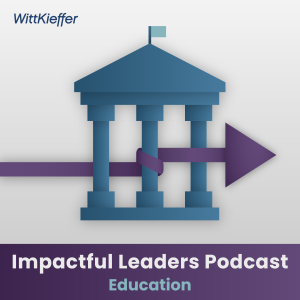
Tuesday Jul 01, 2025
Tuesday Jul 01, 2025
Brian Rosenberg, PhD, has become a leading voice for change in higher education, challenging the status quo and (as noted in Part I of this two-part podcast) striving to ensure that bureaucracy does not overwhelm the humanity essential to higher learning.
In Part II of his conversation with WittKieffer Senior Advisor Elsa Núñez, EdD, Dr. Rosenberg expands upon why higher education must "break through the bubble of normalcy" and find new and better ways of serving students and sustaining its institutions.
Today's college presidents, provosts, and other leaders must be transparent and brutally honest with faculty and other constituents about the challenges they face, he believes. To win people over, "relentlessly present them with evidence and do it often enough that they believe you," Dr. Rosenberg says, especially around budgeting and finances which are too often shrouded in mystery.
He also advises today's leaders to resist their natural desire to be the "smartest in the room" and to step back and listen to others. "Your job is to empower other people, to make them feel like they're the smartest in the room," he says. "It's not about you."

Tuesday Jun 24, 2025
Tuesday Jun 24, 2025
A former English professor, Brian Rosenberg, PhD, has always drawn leadership lessons from his favorite novelist, Charles Dickens. The primary lesson, he says, is "not to allow bureaucracy to take away your humanity." Dickens eyed the bureaucracies of his day, including universities, suspiciously. During Dr. Rosenberg's 17-year run as President of Macalester College in St. Paul, Minnesota, he often did the same, making it a point to "never lose sight of the fact that I was a human being and the people I was working with were human beings." If that meant breaking the rules now and again, so be it. "I learned from Dickens that you shouldn’t allow your role to trap you," he continues. "As he would put it: Think with your heart and head."
Dr. Rosenberg has been characterized as anti-establishment before and during his presidency, in his current role as a Visiting Professor at the Harvard Graduate School of Education, and as a Senior Advisor to the African Leadership University. His 2023 book, Whatever It Is, I'm Against It, suggests his contrarian nature. In this podcast with WittKieffer Senior Advisor Elsa Núñez, EdD, herself a former president, he reflects upon the forces that have shaped his views on leadership and higher education. He explains his predilection to voice opposition to the status quo and weigh in on social controversies, hoping to set an example. "How can we tell our students to be vocal and change agents if we refuse to be vocal ourselves?" he asks. They also talk about what U.S. and European institutions can learn from global institutions who "do more with less" and readily encourage entrepreneurism, he says.
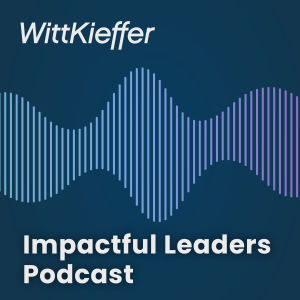
Tuesday Jun 17, 2025
Tuesday Jun 17, 2025
As a Philosophy major in college, Raj Chand, MD had a natural inquisitiveness, a curiosity to understand how things work and can work better, and a desire to understand different points of view. These qualities have served him well, leading him into medicine (to the relief of his parents) as an ER physician and then to leadership roles. As President of Inova Fair Oaks Hospital, he strives to inspire those around him to share a similar curiosity, to learn and grow for personal satisfaction and better patient care.
In this Accelerating Physician Leader Impact podcast – part of our Impactful Leaders series – Dr. Chand speaks with Mike Anderson, MD, co-Executive Director of WittKieffer's Physician Leadership Institute, about his journey in healthcare leadership. Leading 1,400 team members, Dr. Chand has achieved extraordinary results, including five consecutive Leapfrog Top Hospital awards and maintaining CMS five-star ratings.
In their conversation, Dr. Chand discusses some of the top challenges facing physicians today, including burnout and the need for intentional leadership development. He reveals Inova's innovative workforce strategies, from the Northern Virginia Healthcare Workforce Collaborative to strategies for strengthening trust with physician leaders. The discussion explores practical approaches to scaling physician leadership programs and building high-performing clinical teams.
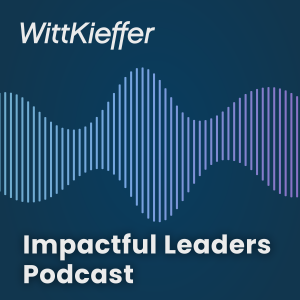
Monday Jun 09, 2025
Monday Jun 09, 2025
While the ROI of physician leadership development is hard to quantify, Paul Viviano, President and CEO of Children's Hospital Los Angeles, sees the benefits in many places – from better care to improved team culture to, importantly, happier physicians. "We demonstrate to all of our team members . . . that we care about them," Viviano says. "The organization wins, the physician wins, and healthcare writ large wins," he says.
In this Accelerating Physician Leader Impact podcast – part of WittKieffer's Impactful Leaders series – Viviano speaks with WittKieffer Senior Partner Michelle Johnson and Principal Mike Anderson, M.D., co-Executive Director of the Physician Leadership Institute. They talk about the headwinds facing healthcare today and how, at CHLA, physicians are more inspired to work together to provide excellent care and move the industry forward. They also discuss CHLA's leadership development programs which offer aspiring and current physician leaders the opportunity for 360-degree feedback, coaching, and customized growth plans. They conclude with Viviano's advice for other leaders who, like him, must decide how to make the most of 24 hours each day.
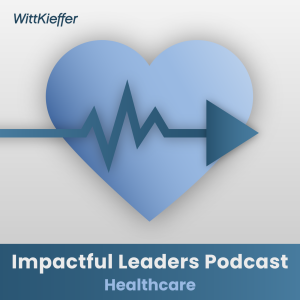
Thursday Jun 05, 2025
Thursday Jun 05, 2025
When Michelle Riley-Brown became President and CEO of Children's National in Washington, D.C., it was the culmination of many formative experiences over decades – in New Orleans growing up a doctor's daughter, in Texas for the bulk of her career in healthcare, and now in the DMV area since 2023. It was a pastor in Houston who gave her the advice, "Blossom where you are planted." In other words, focus on the job you have and the situation you're in presently, and good things will come.
Focusing on each role along her leadership journey has allowed Riley-Brown to thrive. As CEO of the only independent, freestanding children's hospital in Washington, D.C., Riley-Brown plays a critical role in giving voice to issues around children's health and pediatric care in the U.S. and globally. She regularly exercises that voice with lawmakers, to lobby for children who cannot speak for themselves. As she notes, children's healthcare in the U.S. is funded less than healthcare for adults, it's important to close that difference. "It's our job in pediatric healthcare to be that voice," she says.
In this Impactful Leaders Podcast with WittKieffer Senior Partner Rachel Polhemus, Riley-Brown shares her leadership journey (she's one of four out of five siblings who pursued healthcare careers), the tremendous impact of her physician father, and her leadership style of listening carefully to the input of others while using her own voice for greatest impact. Enjoy their conversation.
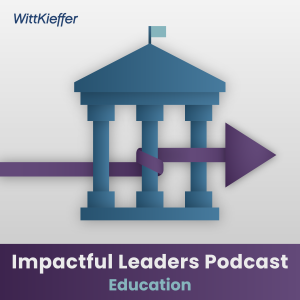
Wednesday May 28, 2025
Wednesday May 28, 2025
"AI is like a tsunami washing over society," says Paul LeBlanc, PhD, higher education innovator, author, and cultural visionary. The world changed with the advent of ChatGPT, he believes, and AI is quickly becoming more powerful than humans in knowledge fields.
The implications for higher education are dizzying, yet few institutions are ready, he says. In the second installment of their two-part conversation, Dr. LeBlanc speaks with WittKieffer Senior Advisor Elsa Núñez, EdD, about how institutions can prepare for an entirely different landscape. Many of the challenges are ontological and existential, he notes: What is the future of work as knowledge economy jobs diminish? What is the university's role in preparing students for this radically different future? What will it mean to have a "good life" in the coming decades?
Drs. LeBlanc and Núñez wrestle with weighty questions, yet settle upon the fact that kindness, humanity and, indeed, "love" will remain central to higher education and institutional success in the future.
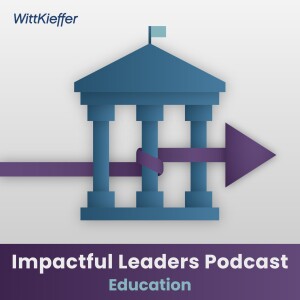
Tuesday May 20, 2025
Tuesday May 20, 2025
The child of a blue-collar Canadian family, Paul LeBlanc, PhD, has gained notoriety as one of the most successful innovators in U.S. higher education. What drew Dr. LeBlanc to academia was the human interaction between teacher and student and its transformative power. No matter how higher education evolves and innovates, he believes, that fundamental connection must remain.
Disruptive innovation doesn't just happen by "throwing spaghetti at the wall," Dr. LeBlanc says, but requires forethought ("knowing what kind of innovation you are trying to do"), the right people, and the right incentives. Most institutions, he notes, say "We care about our students" and yet don't incentivize faculty and staff to truly care and prioritize the student experience.
In this first installment of a two-part series with WittKieffer Senior Advisor Elsa Núñez, EdD, Dr. LeBlanc speaks about his career journey and how it led him to innovate and find new and better ways to reach students, most notably as president of Southern New Hampshire University, author of Broken, and co-founder of the company Matter and Space. Innovating and advocating for change hasn't always been easy, he shares: "You do more by getting kicked to the mat than you do by winning the fight."

Tuesday May 13, 2025
Tuesday May 13, 2025
Like many physician executives, Susan Huang, M.D., didn't begin her career with leadership in mind but gravitated in that direction when it became clear she could have a greater impact – impact "at scale". That realization has led her to her current role as Chief Physician Executive at Providence and Chief Executive of Providence Clinical Network.
In our latest Impactful Leaders Podcast, Dr. Huang speaks with Consultant Vinny Gossain about her career journey and approach to leading others. Whether overseeing a handful of physicians or hundreds, Dr. Huang has learned to embrace a learning mindset, to exercise humility, and to trust the expertise of those around her in an increasingly complex healthcare environment. One might say that Dr. Huang, a dermatologist by training, is comfortable in her own skin as a physician leader.
While the current environment is complex and unpredictable, Dr. Huang reminds those around her that healthcare has always been daunting and uncertain. The key, she says, is to adapt. "With change our responsibility is to think, 'How do we change?'"
Dr. Huang's career advice for other physician leaders is twofold: "Just say yes" in looking for opportunities to grow as a leader; and "Find a way" in terms of seeking unique solutions for seemingly intractable challenges. Enjoy their conversation.
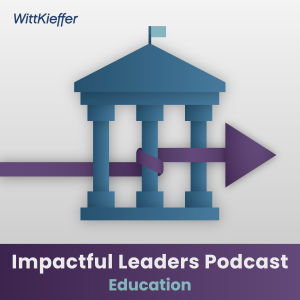
Tuesday May 06, 2025
Tuesday May 06, 2025
At age 14, Teresa Flannery, PhD worked a short stint on the National Mall in Washington, D.C., teaching visitors to the city how to play American children's games, from Red Light Green Light to Red Rover. It was a memorable experience that foreshadowed her current leadership as Executive Vice President and Chief Operating Officer of the Council for Advancement and Support of Education. Terry has worked with CASE colleagues and leaders across higher education in an ongoing effort to review and revise the standards and metrics by which higher education institutions operate – the rules of the game – in areas such as philanthropy, alumni engagement and, currently, marketing and communications, and to disseminate them to more than 3,000 member institutions in more than 80 countries worldwide.
Higher education, she admits, faces immense challenges today in justifying its value to an increasingly skeptical public. In this conversation with WittKieffer's Melissa Fincher, Terry shares insights into industrywide efforts CASE is supporting to better communicate what makes higher education special and how it is a "strategic asset" for countries around the world. She maintains optimism and a broad perspective on the future—higher education has been around for more than 1,000 years and has adapted to challenges before; it will do so again, she believes.
Throughout her career Terry has learned to "lean more into curiosity and less into judgment" in approaching challenges and guiding her colleagues and team members. Wrapping up the conversation, she advises other leaders to exercise patience in their careers: "You can have everything," she says, "you just can't have it all at once."


